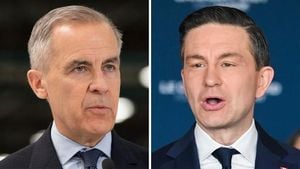During the 2025 election campaign, the political landscape in Canada has been notably charged, with both leading candidates for Prime Minister adopting the phrase "Maîtres chez nous" to assert their commitment to national sovereignty in the face of external pressures, particularly from the United States. This expression, which translates to "Masters in Our Own House," resonates deeply within the collective memory of Quebec's history, yet its appropriation by federal leaders raises significant concerns.
The phrase was popularized during the Quiet Revolution and has roots in the writings of Lionel Groulx, who stated in 1937, "The only choice left to us is this: either to become masters in our own house again, or to resign ourselves forever to the destinies of a people of serfs." Groulx's words encapsulated a call for collective emancipation among French Canadians, who felt economically, culturally, and politically marginalized in their own country. Thus, when an English-speaking Prime Minister uses this expression without acknowledging its profound historical context, it is perceived as a form of symbolic appropriation.
Simon-Pierre Thibeault, a social sciences student at Université Laval, argues that this appropriation transforms a powerful symbol of resistance into a mere electoral tool. He likens the situation to the dominant culture co-opting the cries of the oppressed, effectively stripping the expression of its subversive potential and overlooking the historical struggles that have allowed Quebec to reclaim some control over its culture and institutions. By utilizing this slogan without respect for its origins, political leaders risk trivializing a significant narrative in Canadian history.
As the election draws nearer, the rhetoric surrounding ecological issues has also shifted dramatically. According to various political leaders, it seems that ecological concerns in Canada are becoming a thing of the past. Mark Carney, upon taking office, wasted no time in cutting the carbon tax, a cornerstone policy of the federal Liberals aimed at signaling a shift towards more sustainable energy practices. This decision has sparked criticism and highlighted a growing consensus among political elites favoring fossil fuel extraction, overshadowing previous commitments to decarbonization.
In stark contrast, the Conservative Party, led by Pierre Poilievre, has been upfront about its intentions regarding energy corridors, which they explicitly state will be pipelines leading to hydrocarbon export infrastructures, including liquefied natural gas plants. The Liberals, however, have adopted a more ambiguous stance, suggesting that these corridors will promote both renewable and traditional energy sources, the latter of which includes fossil fuels.
Poilievre has been vocal about the carbon tax for months, framing the upcoming elections as a referendum on this policy. Despite its limited impact, the tax was initially seen as a step towards transitioning away from fossil fuels, mirroring initiatives taken by Quebec. However, this signal of change has largely failed to resonate in Western Canada and among financial stakeholders heavily invested in the fossil fuel sector.
The arrival of Donald Trump as a major political figure in the U.S. has further complicated Canada's energy landscape. In the wake of his presidency, a regression has been observed in Canada's environmental initiatives, with many political leaders retreating from modest proposals aimed at reducing reliance on fossil fuels. During the leaders' debate on April 16, 2025, both Carney and Poilievre reached a consensus that Canadian oil extraction must increase, a stance that has alarmed environmental advocates.
Trans Mountain, initially a private project of an American multinational, exemplifies the shifting priorities in Canada's energy policy. When the federal government acquired the project, its completion was estimated to cost around 10 billion dollars. However, the total expense has now ballooned to over 30 billion dollars, raising questions about fiscal responsibility and the implications of public funding for fossil fuel infrastructure.
The current trajectory of energy policy in Canada is alarming to many observers. The so-called "green social contract" that once accompanied the carbon tax has dissipated, leaving fossil fuel infrastructure intact while greenhouse gas emissions continue to rise. Critics argue that Canada is no longer speaking the language of international commitments, such as those outlined in the Kyoto Protocol, which emphasized ensuring a viable future for generations to come.
The political discourse surrounding energy in Canada has taken a decidedly pro-fossil fuel turn, with both major parties seemingly aligned on the need to bolster oil extraction. This alignment reflects a broader trend of prioritizing economic growth over environmental sustainability, a shift that many fear could undermine efforts to combat climate change.
In this context, the responsibility to resist the push towards increased fossil fuel dependency falls on the shoulders of Canadian citizens and leaders who advocate for sustainable practices. As the political climate evolves, only a few regions, like Quebec and certain U.S. states such as California, continue to challenge this narrative, insisting on the necessity of transitioning away from fossil fuels.
Ultimately, the story of Canada’s political landscape and its relationship with energy resources is one of complexity and contradiction. The appropriation of historical symbols like "Maîtres chez nous" and the retreat from ecological commitments reflect deeper societal tensions that demand careful consideration and action. As the country stands at a crossroads, the choices made in the coming months will undoubtedly shape the future of Canada’s identity and its environmental legacy.





